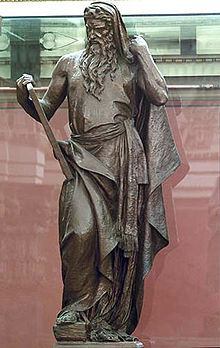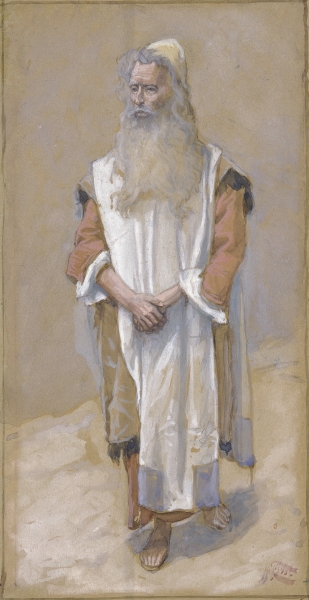
Moses by Victorvictori, permission granted by author through WikiCommons
Deuteronomy 32: 1-14: The Faithful Rock Provides
1 Give ear, O heavens, and I will speak; let the earth hear the words of my mouth.
2 May my teaching drop like the rain, my speech condense like the dew;
like gentle rain on grass, like showers on new growth.
3 For I will proclaim the name of the LORD;
ascribe greatness to our God!
4 The Rock, his work is perfect, and all his ways are just.
A faithful God, without deceit, just and upright is he;
5 yet his degenerate children have dealt falsely with him,
a perverse and crooked generation.
6 Do you thus repay the LORD, O foolish and senseless people?
Is not he your father, who created you, who made you and established you?
7 Remember the days of old, consider the years long past;
ask your father, and he will inform you; your elders, and they will tell you.
8 When the Most High apportioned the nations, when he divided humankind,
he fixed the boundaries of the peoples according to the number of the gods;
9 the LORD’s own portion was his people, Jacob his allotted share.
10 He sustained him in a desert land, in a howling wilderness waste;
he shielded him, cared for him, guarded him as the apple of his eye.
11 As an eagle stirs up its nest, and hovers over its young;
as it spreads its wings, takes them up, and bears them aloft on its pinions,
12 the LORD alone guided him; no foreign god was with him.
13 He set him atop the heights of the land, and fed him with produce of the field;
he nursed him with honey from the crags, with oil from flinty rock;
14 curds from the herd, and milk from the flock, with fat of lambs and rams;
Bashan bulls and goats, together with the choicest wheat—
you drank fine wine from the blood of grapes.
This poem of Moses could fit in the book of Jeremiah as easily as the book of Deuteronomy. It in poetic form foreshadows the sweep of the Deuteronomic history which runs from Joshua to 1 and 2 Kings. This is a difficult song to write out and let the words seep out of the pen onto the paper as you hear them. It is dark, and as we heard in Deuteronomy 31:19 the purpose of the song is to be another witness against the people of Israel when they turn to be unfaithful. When they trust in other gods and the LORD abandons them (or actively brings about) the consequences the people are to know and understand. If the song looks forward, peering into the darkness of the future, the poet speaks the darkness in the hope that the words (for those are the only weapons the poet and songsmith have) might alter the path of the future. While the author of Deuteronomy has a dim view of the potential for the people of Israel to remain faithful, it is still their hope. Their anxiety over the disaster they foresee is matched by the intensity of the words they use to try to wake up the people to change the course they seem to be marching upon.
The song begins in praise of the God of Israel and the faithfulness of that God. Throughout this song the Rock will become the metaphorical name for God and be a contrast between the unbending faithfulness of the LORD the God of Israel and the degenerate children of a perverse and crooked generation. Yet, even this generation is called back to their ancestors who still remember and the elders who still trust in the LORD. Just as throughout the book of Deuteronomy it is the responsibility of the previous generation to ensure the fidelity of the upcoming generations, to remind them over and over of the way in which their God has provided for them and the special relationship they have with their God.
One of the reasons that many scholars think this is an early poem (or at a minimum this first section) is that it is not strictly monotheistic. The LORD allots to the other nations other gods, and what make Israel unique is that the Most High God has chosen them and therefore they are to have no other gods before the LORD their God. In beautiful poetic language it expresses that the people are God’s beloved and the ways in which God has sheltered and provided for them. God is an eagle hovering over its nest or bearing its young into the air on its wings. The LORD has provided all the best things: crops of the field, milk and curds from the cows and goats, the best meat from the sheep and bulls and goats, fine wine and bread. Yet, the fear of Deuteronomy is that in the midst of abundance that the people will forget who provided for them. That is where the poem takes its dark turning.
Deuteronomy 32: 15-25 The Fattened People Forgets
15 Jacob ate his fill; Jeshurun grew fat, and kicked. You grew fat, bloated, and gorged!
He abandoned God who made him, and scoffed at the Rock of his salvation.
16 They made him jealous with strange gods, with abhorrent things they provoked him.
17 They sacrificed to demons, not God, to deities they had never known,
to new ones recently arrived, whom your ancestors had not feared.
18 You were unmindful of the Rock that bore you; you forgot the God who gave you birth.
19 The LORD saw it, and was jealous he spurned his sons and daughters.
20 He said: I will hide my face from them, I will see what their end will be;
for they are a perverse generation, children in whom there is no faithfulness.
21 They made me jealous with what is no god, provoked me with their idols.
So I will make them jealous with what is no people, provoke them with a foolish nation.
22 For a fire is kindled by my anger, and burns to the depths of Sheol;
it devours the earth and its increase, and sets on fire the foundations of the mountains.
23 I will heap disasters upon them, spend my arrows against them:
24 wasting hunger, burning consumption, bitter pestilence.
The teeth of beasts I will send against them, with venom of things crawling in the dust.
25 In the street the sword shall bereave, and in the chambers terror,
for young man and woman alike, nursing child and old gray head.
As I’ve been listening to this song of Moses throughout this week I’ve also been reflecting upon the way other popular songs work to try to bring about change and yet may feel overwhelmed by the social forces that seem to be giving rise to the undesired reality. For example, when the punk band Green Day released their American Idiot CD they weren’t desiring the character of the American Idiot to be the reality, they were mocking the emerging culture controlled by a conservative media. Countless songs from numerous genres could be lifted up as attempting to be a voice calling upon the future to change and yet the poets may feel powerless as in the classic Simon and Garfunkel song, The Sound of Silence:
“Fools” said I, “you do not know
Silence like a cancer grows
Hear my words that I might teach you
Take my arms that I might reach you”
But my words like silent raindrops fell
And echoed in the wells of silence
Here the words of the song are placed in Moses’ mouth and just as in the previous chapter the hope is that the words will turn the direction that the people are moving in even when the anxiety is that the words will echo in the wells of silence. The words may bear witness but the people are hearing without listening. Moses prophetically chimes against when the people will bow and pray to the gods of stone and iron and gold they will make. In their fatness and wealth, they will forget the source of their blessings and attribute it to themselves and other things. Later prophets, like Jeremiah, who will attempt to be an echo of the words of this song will be treated as traitors, as woe bringers and will be resisted throughout their life. In the poetry of the song and of the later prophets sometimes the LORD will passively hide God’s face and surrender people to their fate, at other times God will actively bring upon the people their destruction, famine, and illness. In exchanging their Rock for idols of stone they have turned away from their foundation and reason for being. The song desperately rages to try to call the people to return to the LORD their God, and yet it knows people are likely to craft images of other gods rather than accept the God whom they cannot make an image of.
Deuteronomy 32: 26-30 A Remnant but Not for Your Sake
26 I thought to scatter them and blot out the memory of them from humankind;
27 but I feared provocation by the enemy, for their adversaries might misunderstand and say,
“Our hand is triumphant; it was not the LORD who did all this.”
28 They are a nation void of sense; there is no understanding in them.
29 If they were wise, they would understand this; they would discern what the end would be.
30 How could one have routed a thousand, and two put a myriad to flight,
unless their Rock had sold them, the LORD had given them up?
As in the book of Jeremiah, much of the language here is of a wounded God, a God who is contemplating the betrayal of the people of God. Woven into this song is the appeal of Moses in Exodus 32: 11-14 where he appeals to God on behalf of the people after the incident with the golden calf.
11 But Moses implored the LORD his God, and said, “O LORD, why does your wrath burn hot against your people, whom you brought out of the land of Egypt with great power and with a mighty hand? 12 Why should the Egyptians say, ‘It was with evil intent that he brought them out to kill them in the mountains, and to consume them from the face of the earth’? Turn from your fierce wrath; change your mind and do not bring disaster on your people. 13 Remember Abraham, Isaac, and Israel, your servants, how you swore to them by your own self, saying to them, ‘I will multiply your descendants like the stars of heaven, and all this land that I have promised I will give to your descendants, and they shall inherit it forever.'” 14 And the LORD changed his mind about the disaster that he planned to bring on his people.
Here the logic of Moses now becomes woven into the logic of God and the logic of the song. It is so other nations do not become puffed up in their own accomplishment that a remnant is allowed to remain. In a set of brokenhearted lyrics where the LORD no longer appears to love the people and yet feels obligated to save them yet again we find a reason for that remnant to remain.
Deuteronomy 32: 31-43 There is No Rock Like our Rock
31 Indeed their rock is not like our Rock; our enemies are fools.
32 Their vine comes from the vinestock of Sodom, from the vineyards of Gomorrah;
their grapes are grapes of poison, their clusters are bitter;
33 their wine is the poison of serpents, the cruel venom of asps.
34 Is not this laid up in store with me, sealed up in my treasuries?
35 Vengeance is mine, and recompense, for the time when their foot shall slip;
because the day of their calamity is at hand, their doom comes swiftly.
36 Indeed the LORD will vindicate his people, have compassion on his servants,
when he sees that their power is gone, neither bond nor free remaining.
37 Then he will say: Where are their gods, the rock in which they took refuge,
38 who ate the fat of their sacrifices, and drank the wine of their libations?
Let them rise up and help you, let them be your protection!
39 See now that I, even I, am he; there is no god besides me.
I kill and I make alive; I wound and I heal; and no one can deliver from my hand.
40 For I lift up my hand to heaven, and swear: As I live forever,
41 when I whet my flashing sword, and my hand takes hold on judgment;
I will take vengeance on my adversaries, and will repay those who hate me.
42 I will make my arrows drunk with blood, and my sword shall devour flesh—
with the blood of the slain and the captives, from the long-haired enemy.
43 Praise, O heavens, his people, worship him, all you gods!
For he will avenge the blood of his children, and take vengeance on his adversaries;
he will repay those who hate him, and cleanse the land for his people.
The song ends with a move towards hope, much like in Deuteronomy 30 where now the LORD will turn on behalf of the remnant of the people once they have undergone the judgment. In a poetic turning the vanquished people now mock their former conquerors in their weakness after the LORD’s vengeance. For the people of Israel, the LORD is the primary actor and the gods of the nations are unable to stand in the presence of the LORD. Much like Isaiah 44: 9-20 which mocks the idols of the nations or Jeremiah 50-51 which speaks of the destruction of Babylon, these words can speak for the hopeless people with the hope of the LORD’s actions on the idols and the nations. The poem closes with warrior imagery for God (flashing sword, arrows drunk with blood, etc.) where God’s vengeance is acted out in a bloody fashion. I have talked about the warrior imagery of God in other place, but here for the people of Israel it is a reminder that there is no Rock like their rock. Even in their apparent weakness their God is a mighty God.
Deuteronomy 32: 44-52 Preparing for Moses Death
44 Moses came and recited all the words of this song in the hearing of the people, he and Joshua son of Nun. 45 When Moses had finished reciting all these words to all Israel, 46 he said to them: “Take to heart all the words that I am giving in witness against you today; give them as a command to your children, so that they may diligently observe all the words of this law. 47 This is no trifling matter for you, but rather your very life; through it you may live long in the land that you are crossing over the Jordan to possess.” 48 On that very day the LORD addressed Moses as follows: 49 “Ascend this mountain of the Abarim, Mount Nebo, which is in the land of Moab, across from Jericho, and view the land of Canaan, which I am giving to the Israelites for a possession; 50 you shall die there on the mountain that you ascend and shall be gathered to your kin, as your brother Aaron died on Mount Hor and was gathered to his kin; 51 because both of you broke faith with me among the Israelites at the waters of Meribath-kadesh in the wilderness of Zin, by failing to maintain my holiness among the Israelites. 52 Although you may view the land from a distance, you shall not enter it– the land that I am giving to the Israelites.”
As the song ends we are reminded once again that we are approaching the end of Moses’ story. Here, in contrast to the earlier narrative of Deuteronomy where the LORD is angry with Moses because of the people (see Deuteronomy 1: 37, 3: 26, 4:21), now we are linked back to the narrative of Numbers 20: 10-12 as the reason for Moses’ upcoming death. The stage is set for the final chapter of Deuteronomy where Moses ascends the mountain never to return, yet Moses still has a final blessing to declare upon the people prior to the ending of his journey. One final benediction to come from the teacher, leader, mediator, judge and bringer of the law to sustain the people on their journey into the promised land.










